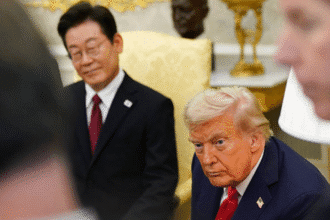Xi Jinping’s most recent diplomatic trip across Southeast Asia underlines China’s increasing importance of trade diplomacy. Southeast Asia has grown to be a crucial area for China’s long-term goal of keeping its global economic position as China confronts rising tensions with the United States. Xi’s trip to Vietnam, Malaysia, and Cambodia seeks to deepen China’s economic ties with these nations and support that China is a consistent, dependable friend in world commerce as the US taxes Chinese exports.
- Why is Xi concentrating his commercial diplomacy on Southeast Asia?
- How is China's trade diplomacy in Southeast Asia altering regional dynamics?
- In what part does trade diplomacy by China in Southeast Asia contribute to world economic stability?
- How can China's trade diplomacy in Southeast Asia affect future ties?
- In essence, China's trade diplomacy in Southeast Asia will evolve.
Through diplomatic efforts, China aims to establish closer relations with Southeast Asian countries, presenting opportunities for economic development and scientific innovation. With its fast-growing economy and strategic location, the area is perfect for China to increase its impact. Especially while tensions with the United States keep rising, China’s commercial diplomacy in Southeast Asia is vital in confirming China’s position in the world economy.
Why is Xi concentrating his commercial diplomacy on Southeast Asia?
China’s trade diplomacy increasingly revolves around Southeast Asia, and Xi Jinping’s visit highlights this strategic orientation. China finds the area appealing, as several of the fastest-growing economies in the world call it home. Though these nations are progressively turning to China for prospects that fit their economic aspirations, economies like Vietnam, Malaysia, and Cambodia have substantial commercial links with both China and the United States.
Xi underlined the need to develop closer bilateral ties during his trip to Vietnam, primarily through trade agreements and infrastructure projects. For instance, Vietnam is now a major actor in China’s economic plan since it is a great friend in the manufacturing and export industries. However, these countries are cautious about avoiding depending too much on one country. Keeping a balanced relationship with the US is still vital.
Xi’s visit reminds us that China’s commercial diplomacy in Southeast Asia is about preserving the area’s stability and security in a fast-changing global scene, not just economic transactions. In this setting, Xi’s message was unambiguous: China is dedicated to cooperating with Southeast Asia to challenge trade policies endangering the integrity of world supply systems.
How is China's trade diplomacy in Southeast Asia altering regional dynamics?
The diplomatic actions taken by Xi Jinping are drastically changing the trade dynamics in Southeast Asia. Particularly as commerce between China and Southeast Asian nations rises, the area is growingly dependent on China’s trade diplomacy in Southeast Asia. Trade agreements such as the Regional Comprehensive Economic Partnership (RCEP) have strengthened China’s sway in the area. These accords promote economic cooperation and integration, establishing China as a major actor in the Southeast Asian economic future.
Xi’s recent trips to Vietnam, Malaysia, and Cambodia have concentrated on deepening these commercial relations. Xi visited with key officials in Vietnam, including Prime Minister Pham Minh Chinh, to explore increasing trade and investment. Chinese manufacturing, technology, and infrastructure investments have greatly benefited both nations. To further China’s influence on Vietnam’s growth, Chinese businesses have participated in building roads, railroads, and energy infrastructure projects there.
China’s trade diplomacy in Southeast Asia does, however, provide difficulties, even if it has been crucial in promoting economic cooperation. The surrounding nations are juggling their ties to China and the US. Many Southeast Asian countries still rely heavily on the US. Hence, they must carefully negotiate their positions to ensure they do not offend the US while profiting from China’s increasing economic weight.
In what part does trade diplomacy by China in Southeast Asia contribute to world economic stability?
Global economic stability suffers much depending on China’s trade diplomacy’s growing impact in Southeast Asia. Many countries are searching for substitutes for the uncertainty of protectionist policies as the US and China fight a continuing trade war. With its enormous wealth and developing technological capacity, China is filling in this gap.
The building of the 5G network in Malaysia is among the most notable illustrations of China’s commercial diplomacy in Southeast Asia. Using China’s Huawei and ZTE infrastructure, Malaysian telecom company U Mobile declared it would create Malaysia’s second 5G network. This agreement enhances China’s economic and strategic footprint in Southeast Asia and improves Malaysia’s technological capacity. China’s impact keeps increasing as other nations adopt comparable contracts.
Moreover, China’s larger plan to guarantee the integrity of world supply chains includes its attempts to guarantee significant infrastructure projects across Southeast Asia. China can affect the future course of the area by presenting itself as a vital partner in commerce and development. China is presenting itself as a dependable, steady economic friend for Southeast Asian nations in a tumultuous trade conflict with the US.
How can China's trade diplomacy in Southeast Asia affect future ties?
China’s trade diplomacy in Southeast Asia will remain important in determining the area’s political and economic environment. The growing economies of Southeast Asia depend increasingly on China as a significant trading, technological, and infrastructure partner. Also greatly influencing this change is China’s Belt and Road Initiative (BRI), which is concentrated on building trade routes and infrastructure.
Not only are nations like Vietnam, Malaysia, and Cambodia gaining from Chinese investments, but they also understand strategically the need to keep close relations with China. These countries will rely more on China for economic development as China keeps increasing its influence in the area, especially in sectors such as manufacturing, trade, and technology. Nonetheless, as China’s influence rises, Southeast Asian nations will keep control of their interactions with the US to guarantee access to trade routes and essential markets.
Xi Jinping’s most recent trip to Southeast Asia reminds us that China’s trade diplomacy in that region goes beyond only promoting economic development. It concerns determining the course of the world economy. China and Southeast Asia must cooperate as the region’s financial links to China keep growing to negotiate the potential and problems of a globe becoming more linked.
In essence, China's trade diplomacy in Southeast Asia will evolve.
Finally, China’s trade diplomacy in Southeast Asia serves not only to strengthen China’s standing as a major participant in world trade but also to guarantee fresh economic alliances. Xi Jinping’s visits to Vietnam, Malaysia, and Cambodia underline the need for economic cooperation and show China’s will to uphold a consistent worldwide trade system. The future of China’s trade diplomacy in Southeast Asia will undoubtedly be vital in determining the global economic order as Southeast Asian countries continue interacting with China and the US.








